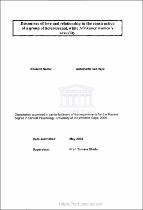| dc.description.abstract | In South Africa, recent sex research which informs HIV prevention campaigns, has focussed almost exclusively on young people of colour, whilst the sexual experiences of older, white and specifically Afrikaner women have remained largely undocumented. These gaps have to
be addressed for at least two reasons. Firstly, an understanding of the ways in which older, white Afrikaner women construct their sexuality will enhance our understanding of female sexuality in general. More specifically, the high prevalence of HIV infection in the white South African population (in comparison to other countries such as Australia, France and the USA, where the prevalence among the white population is lo/o or less) needs urgent attention. This study attempted to address these gaps in South African research by exploring the
construction of five white, middle-class, Afrikaner women's sexuality and the relevance thereof to women's protective sexual behaviour with regard to HIV/AIDS. The respondents' ages ranged from twenty-eight to forty years. A critical challenge in this study was to problematise the connections between constructions of female sexuality and love/relationship, as much popular discourse as well as socio-biological and (some) radical feminist and psychological writings on female sexuality have reduced this relationship to one of monolithic essentialism. This study therefore focussed on an exploration of the contradictory subjective discursive positionings and the implications for theoretical and empirical work on sexual negotiation and for HIV/AIDS interventions in this country. In order to do this, one focus group discussion and five individual in-depth interviews were conducted with the five respondents. Interpretative discourse analysis developed by Hollway (1984, 1989, 1995, 1996) provided the feminist, post-structuralist and psychoanalytic tool to explicate and analyse the discourses of female sexuality that surfaced in the study. Underpinning many of these discourses was an understanding of men and women as inherently different and "other"
to each other. | en_US |

